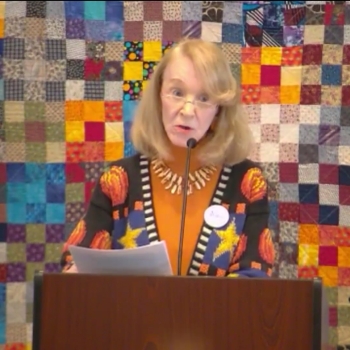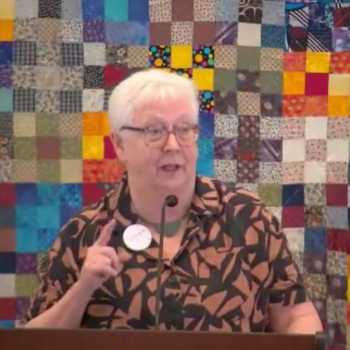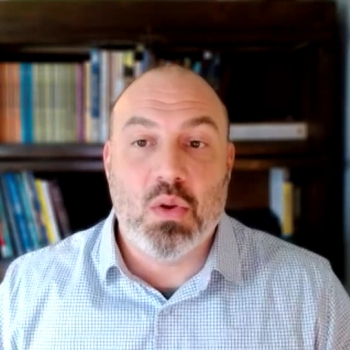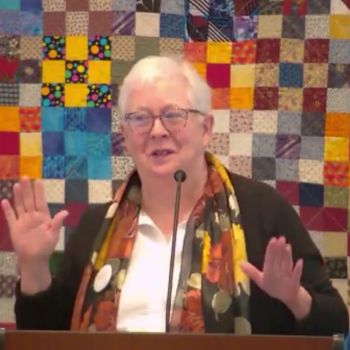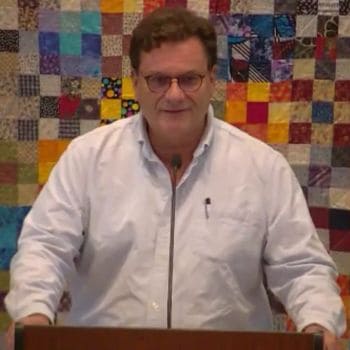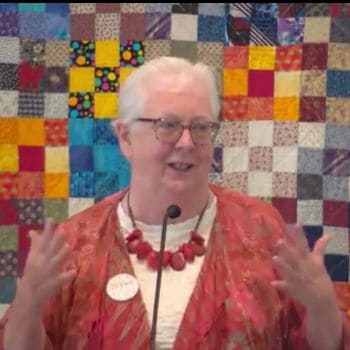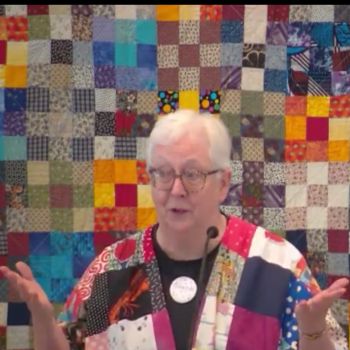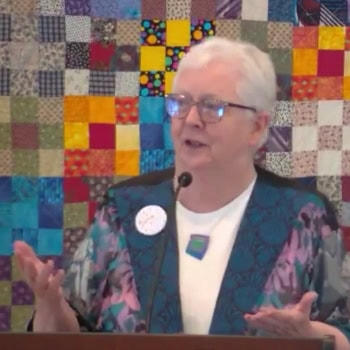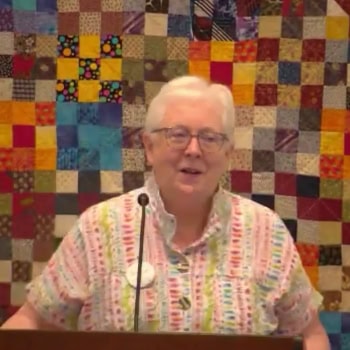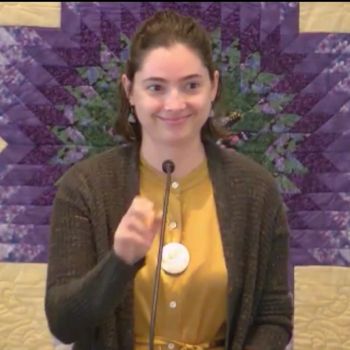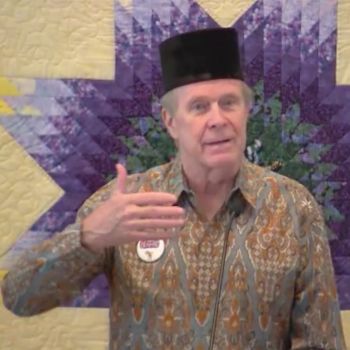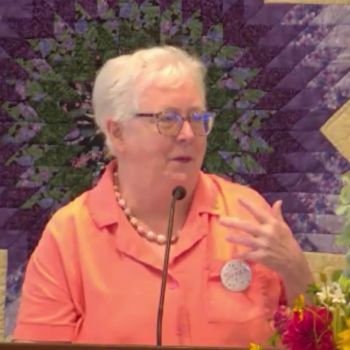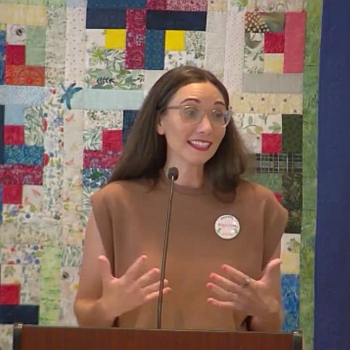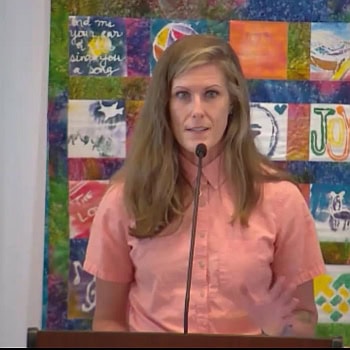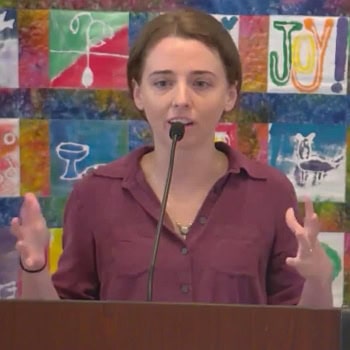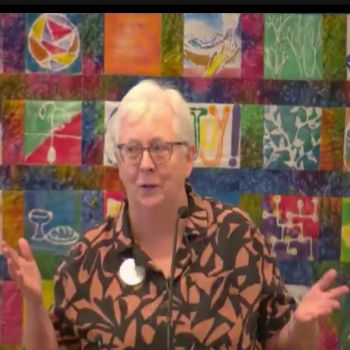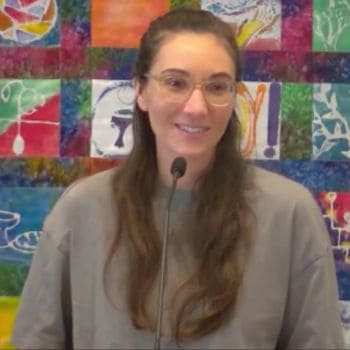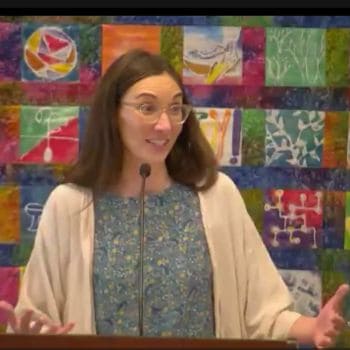Discover Raleigh Mennonite Church
Raleigh Mennonite Church

157 Episodes
Reverse
2 Timothy 1:3-7, Philippians 1:3-4,7
Ann Robertson brought the message this Sunday prior to Thanksgiving. She reminded us of the importance of being grateful for the people in our lives who have made a difference and reflected on the ways that gratitude benefits us. Ann also provided some solutions to address times when we might not be so grateful, three of which were portrayed humorously by Hans.
As Paul told the church in Philippi, "I thank God every time I think of you."
1 Thessalonians 5:16-19
As we approach Thanksgiving, Susan provided suggestions for how to live into a life of gratitude.
The book of Thessalonians is said to be the oldest writing in the new testament. The letter is written to a church facing persecution, with the people fearing for their lives. Yet the writer tells them to, "Rejoice always, pray without ceasing, and to give thanks in all circumstances."
Gratitude isn't just a practice for the good times.
Because the important thing is not just to think about gratitude, but to do it, we were provided an opportunity to reflect on things we're grateful for and share at least one of those things with our neighbor. Susan also provided some ways to practice gratitude and incorporate these habits into our daily lives.
Proverbs 3:9-17
Our guest speaker this Sunday was Franco Salvatori, an Everence stewardship consultant. Due to flight cancellations he couldn't be with us in person, so he shared his message via Zoom.
Consumerism is a unifying religion in America. It's the thing that makes you wish you just had more. But as Christ's followers we're called to worship only one God, and it's not consumption. It's easy to fill our lives with stuff, but still be empty.
The path toward an overflowing life is through wisdom and generosity. Honoring God with our first fruits is the practice of recognizing God's hand in providing the resources that we have.
God calls us to give of our first fruits not because God needs it, but because it actually changes us. It changes our hearts and helps us focus on the giver. As we practice that discipline it creates an attitude in us that Franco called wealth. If we've developed an action of giving and of generosity, because we are seeking wisdom and we're seeking God, then it's the exact opposite of consumerism. And Proverbs tells us that is the pathway to an overflowing life.
Ephesians 1: 15-23 Ephesians 3: 14-21
When you pray to God, what underlying assumptions about God do you bring to the interaction? Do you believe God to be: loving? trustworthy? concerned with your life? These assumptions, and honestly our biases, fundamentally shape how we pray, the nature of our prayer life, and a good portion of our spiritual journey as a whole. Susan Scott preached on the prayer that started in Ephesians 1, was interrupted, and finished in Ephesians 3. What can we learn from this prayer? God is knowable, worth knowing, and stands ready to impart the wisdom and most importantly, the hope that we need. This hope is not for riches or aggrandizement, but rather that God will do what they have promised to do and to aid us in our calling. This hope allows us to wait patiently for the things that God has promised that we do not yet have. Ultimately, this hope is that God will reconcile all things in heaven and earth through Jesus. Hope give us the ability to endure the feelings of helplessness and despair when the world around us seems dark and unredeemable: when all of our efforts to bring light and salt appear futile. Remember that God wastes none of the work that they call you to do and that is all a part of a plan of redemption that started even before Christ appeared.
Matthew 4: 8-10
Mauricio Chenlo preached on Satan’s temptation of Christ, offering him all of the kingdoms of the world. Similarly, often we depend on the kingdoms of the world to deliver the kingdom of God. Mauricio related his experiences growing up in Argentina where he experienced Christian faith expressed in the nation’s politics swing wildly from right to left as the government went from a dictatorship to a Marxist government. He even heard the preaching on liberation theology about the kingdom of God from the dictator Ortega of Nicaragua in the 90s. Politics is the process by which people make collective decisions about how to live together by distributing power, responsibilities and resources. So, who gets to define these priorities? In this country it seems that we are told to change our politics every four years. Likewise, the Church historically has been tempted to align with political ideologies. Jesus, however, brings a different kind of politics. Jesus rejected alignment with any of the political ideologies of his time. The role of the Church is to be a witness and an extension of the kingdom of God in this world, because we still must be in the world even if we are not of the world. We cannot just focus on feeding people’s bodies (not on bread alone); we must also nourish people spiritually. We must not manipulate God’s word, love, or message to gain power or popularity.
Luke 18: 1-8
Susan Scott preached on the unusual prayer practices of Jesus in the Gospel of Luke. Jesus was steeped in the prayers of the Jewish people, but Luke recounts that he Jesus instructed his followers to pray in a different way, including for those that persecute you. The prayers of Jesus in Luke can be divided into two types. We pray for the glory of God's name, work, and kingdom, and we pray for our business, including our daily bread, the forgiveness of sins, and protection from temptation. Susan reminds us that Jesus also told the Parable of the Unjust Judge to remind us to always pray and not give up, just like the woman pursuing justice, and that God is always a just judge. Of course, wouldn't it be easier to have faith if God instantly answered our prayers instead of us having to wait? It would be nice but that places God in the role of being our servant instead of our lord. Oddly, when the disciples asked for more faith, Jesus told them it already takes very little faith to speak miracles into existence. Jesus wants us to not focus on amounts but rather on the love and greatness of God that can enable us to do the impossible. With this in mind, we must relentlessly pray with a steadfast faith and hope in God's goodness, justice, and mercy.
Habakkuk 1: 1-4
Susan Scott preached on World Communion Sunday and reminded us that regardless of our various religious journeys, national origins, denominations, and worship practices (including the incarcerated who cannot choose their mode of worship), that we are all a part of larger Christian Church family that is striving to follow the teachings of Christ. Susan also reflected on the lamentations of Habakkuk from the lectionary scripture. During these very tense, frustrating and worrisome times we are experiencing, it is easy to reflect negativity and despair back into the world. Lamentations, a form of brutally honest prayer, is one way that we can offload these feelings and transition our frustrations into a posture of waiting to hear from God and also a trust in God's love, goodness, and mercy for us.
Mark 14:16-26, Isaiah 25:6-8
Susan spoke this Sunday about something Christians universally practice and everyone maintains is important in some way: the Lord's Supper. Also called Communion, the Eucharist or the Mass.
She painted three word pictures for us that could provide a greater appreciation for what we're doing at the table: a Passover meal, a covenant ratification meal, and a wedding celebration. The thing these three meals and communion all have in common is that they are celebratory. They knit people together and they all have a host. In communion, the Lord's table, Jesus serves as the host.
Lamentations 3:17-26
This Sunday Melissa Rogati shared from her personal story of lament and dealing with a dark period in her life. It's very uncomfortable to be in that place. As humans, we don't like being there. But as she came to eventually realize, God is in the dark too! It's us who feel discomfort when we're in the dark. But if we can't sit in the dark and know that we are safe, where is our faith?
We can force ourselves to be upbeat, even when we don't see the good coming, but that is not authentic. We don't need to force an upbeat spirit to prove anything to anyone, including ourselves. Even when we can't engage with that upbeat, we don't have to force it when we don't want to. But we continue to seek the goodness of those around us while we wait in the dark. Because we still believe, even in the dark, that there's goodness to be had. Because the Lord is good to those who wait for Him. It is good that one should wait quietly for the Lord.
I Corinthians 12:4-13
Following the summer time of gifts discernment, each September Raleigh Mennonite recognizes the many volunteers who help make the church function. This Sunday Susan provided a brief overview of church history and how Mennonites incorporated the concept of the "priesthood of all believers" as a fundamental tenet of our faith and community life together. The idea is that not only can we communicate with and have direct access to God, but that there are indeed no roles that are the exclusive domain of the clergy.
And as we read in I Corinthians 12, all roles are important, and we all have to use our God-given gifts together for the church to thrive. When we use our gifts, or graces, it energizes us. At the same time, we need to check our perceptions of our gifts with others and listen for the affirmation of others in helping us see the gifts that we might have and be called to use. That's where discernment comes in.
Luke 10: 25-28
This week volunteers from the RMC congregation shared dramatic readings, acting out some of the experiences of the founding figures in Anabaptist/Mennonite history that suffered persecution and even martyrdom. This continues our series celebrating 500 years of Anabaptism. The sincere faith and devotion of these individuals to Anabaptist principles are a source of inspiration and encouragement, despite woes and troubles, to follow the path of love set before us by the example of Christ.
Ephesians 2: 14-22
RMC's Leah Weaver preached this week on her own faith story and her history with the Mennonite Church (and RMC specifically). Throughout her time as a youth at RMC, she experienced the love of a "second" family and received inspiration from many members whose lives and ministries demonstrated the love of Christ to strangers. Leah invited us to look at what RMC means to us and where we have found second families in our lives.
1 Peter 2: 11-17
RMC's Hans Linnartz shared from the pulpit last week about the inspiring story of the formation of the Mennonite Church in Indonesia. The ideal of nonviolence is difficult to achieve in the best of circumstances, but the slowly growing Mennonite Church in Indonesia had to overcome challenges from the Dutch colonial government, Japanese military occupation, a war for independence, and tensions with their majority Muslim neighbors. From this story we can learn that what initially seems like setbacks and persecution can be the source of growth, peace, and reconciliation.
Luke 1: 26-38
Susan Scott preached today for the first time as RMC's interim pastor. Susan shared stories from her life's journey and the bible stories that meant the most to her at these most critical and formative parts of her life. With this act of sharing Susan also invites us as well to examine and share with our fellow believers bible stories that has perplexed, inspired, taught, comforted, and sustained us throughout our lives. This introspection on biblical storytelling can connect us to each other and to a deeper understanding of God's steadfast love for us throughout our lives.
John 15:9-17
On this last Sunday of Melissa's pastoral ministry with us at RMC, she spoke from this scripture passage that Jesus shares with his disciples toward the end of his ministry.
Unlike clubs and societies, the foundation of our friendship as the church isn't a shared interest, but a shared good. Friends pursue the good together. And with Christ at our center, the church creates space for those who are vastly different to find out what the good is, and to go after it.
Antoine de Saint-Exupéry said it this way: "Love doesn't consist in gazing at each other,
but in looking outward in the same direction." In the friendship of the church we don't look at each other, but we… stand side by side, so that we're all looking where we're going next. Church is the kind of friendship that says, "I actually think we all need to look at this thing happening here, in this direction and figure out where the path is to get there."
We can discern together when God is calling us towards needs that have been overlooked. When there is something that we need to work out in order to find out where we're going together. We learn to pay attention to people who have been ignored or overlooked.
We gather on streets to protest wars and to speak against genocide, to raise our voices for our church members, because our first loyalty is to Jesus, in whom there is no violence and no vengeance, and no hatred. We care for one another because when we do we see the face of God.
Luke 10:38-42
This Sunday Elizabeth Korver-Glenn shares of the dearth of information she was able to find about early Black and Brown Mennonite leaders, with an even greater lack of any details about Black and Brown Mennonite women. She found brief information about Phoebe Sheela Bisahu Solomon and Rowena Lark in the archives of Mennonite history.
The Gospel reading for today is part of a very long tradition of creative disordering and creative retelling. Jesus upends the established historical archive and the making of an archive by centering the stories of poor and otherwise marginalized people. People who would have been otherwise omitted. The story of Jesus' presence in Martha's home is an example of that reordering. Martha is portrayed and positioned as the head of the house. Mary has adopted the position typically reserved for men: the place at Jesus' feet where she can listen unencumbered by other distractions.
Luke 10:25-37
This summer at RMC we're focusing on telling stories of hope from the Bible. Katie Mangum was our guest speaker this Sunday and shared reflections on one of the most common and beloved of Jesus' parables, that of the Good Samaritan.
Jesus' parables can be frustrating, since many don't have clear meanings. Even this story of the Good Samaritan, which may have obvious meanings on the surface, can be looked at from many different perspectives.
When we weary, exhausted humans, with all our unsolved problems and unanswered questions show up on Sunday mornings, and Jesus tells us what seems to be a riddle about a Samaritan or a vineyard owner or a seed, it can feel a little frustrating. But we know, as Jesus knows, that pat answers won't bind up our wounds. The only thing that has ever been able to do that is a story.
Luke 16: 1-9
RMC's Susan Scott preached this week on what Jesus was trying to do when he spoke in parables. The parables Jesus spoke in are often confusing, indirect, and seldom leave the listener with clear answers to their questions. Why won't Jesus get to the point? However, this storytelling tactic forces the listener to actually listen, ponder, and wrestle in their minds with content of the story. The settings and people in the stories have familiar jobs and roles in Jewish society to draw in the listener, but their unexpected actions require a level of engagement for the listener that precludes the audience from "zoning out". Jesus primarily used two types of parable. One to undercut and derail the accusations of his detractors, and the other to prepare his followers for the radically new kind of kingdom Jesus was ushering in that had nothing to do with their current political subjugation. Furthermore, the parables of Jesus, regardless of the audience, at the end had a punchline that subverted expectations and taught valuable lessons to those with ears to hear. In parables, Jesus told the religious leaders that their obsession with following the law was all a hollow show without any sincere connection to God's will for people to live. Christ's followers in turn were called to live a life of soft hearts and hard feet. A life full of sacrifice, suffering, and radical gift giving that will not make sense to the world, but shows God's love in its fullness . We too must emulate our spiritual forebears and wrestle with these parables so that we may learn to also live with soft hearts and hard feet.
Matthew 5: 43-48
With the recent American bombing of Iran, we now move into a time filled with tension, fear, calls for war, and calls for reprisal. As Christians we must remember that we are called to a different path than the world. Melissa Florer-Bixler preaches on our Covenant Sunday that we must pay close attention to Jesus' first teachings after his temptation in the desert; we must love our enemies and pray for those that persecute us. Yet the gift of peace that God has given us must be worked out through imperfect vessels, namely pacifists like Mennonites and other Christians who hold the ideal of peace close to heart. And how do we figure out this way of peace? Church is where we gather every Sunday to conduct our experiments of peace. There we try, sometimes fail, learn, and share with each other as we try to pass on God's gift of peace to others. As an intentional community of believers we take the risk of being hurt by each other for the opportunity to heal and to be healed.
Romans 5: 1-5
On Trinity Sunday Melissa Florer-Bixler preached on the words of Paul in Romans. Paul didn't focus on what the makeup of the Trinity is, but who the persons of God, Jesus, and the Holy Spirit are. Essentially, God is not vengeful, cruel, or indifferent. God, through the trinity, is the giver of gifts. Jesus is the gift that redeems our sins, and the Holy Spirit is our guide and the wellspring of our hope. Who God is, not what, instructs us on how we should treat each other, our neighbors, and how we build together a faithful Church body. If God is the giver of precious gifts, then we must live a life of radical gift giving and receiving that does not count the cost.


